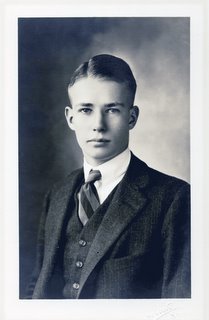 Ever since I started thinking about how to describe my Dad, Thomas Andrews Howell II, I've been dreaming about him several times a week. I've found him in unusual situations - sleeping on a raft floating down a rapid stream, hiding in a tree full of huge flowers, giving a speech at an amusement park, where nobody is listening. He was, in some ways, an elusive guy. Even though he has been gone for more than 20 years, I still find myself searching for him in my memory and in my dreams.
Ever since I started thinking about how to describe my Dad, Thomas Andrews Howell II, I've been dreaming about him several times a week. I've found him in unusual situations - sleeping on a raft floating down a rapid stream, hiding in a tree full of huge flowers, giving a speech at an amusement park, where nobody is listening. He was, in some ways, an elusive guy. Even though he has been gone for more than 20 years, I still find myself searching for him in my memory and in my dreams.Born in 1902, he was the second son in a privileged family. In this photograph, he is the child on the left, with his brothers Hunt and John, and sister Elena.
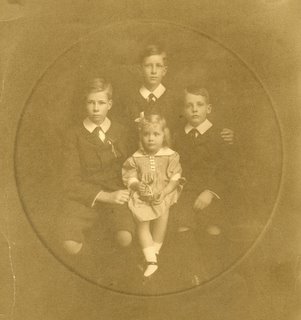 As a young man, my father was sent to prep school, Hotchkiss, and then to Yale University. Here's a photo of him at Yale - he is the one with the top hat, somewhat reminiscent of Jiminy Cricket!
As a young man, my father was sent to prep school, Hotchkiss, and then to Yale University. Here's a photo of him at Yale - he is the one with the top hat, somewhat reminiscent of Jiminy Cricket!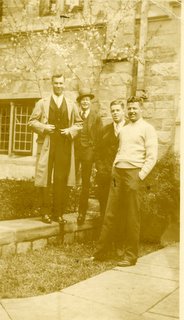 He graduated in 1925, and then apparently took a long trip to Europe to sow some wild oats and get some European culture under his belt. Here is a copy of his French driver's license from this time.
He graduated in 1925, and then apparently took a long trip to Europe to sow some wild oats and get some European culture under his belt. Here is a copy of his French driver's license from this time. The years between 1925 and 1942 are somewhat of a mystery to me. My father did not meet my mother until he was 40, and had apparently been floating about in the high society life of New York, Connecticut, and Long Island during those years. There was a rumor that he had been engaged, for a time, to a member of the Rockefeller family, but he would never talk about that. One thing for certain, he was an early and life-long member of the Angler's Club of New York, and he loved fishing.
The years between 1925 and 1942 are somewhat of a mystery to me. My father did not meet my mother until he was 40, and had apparently been floating about in the high society life of New York, Connecticut, and Long Island during those years. There was a rumor that he had been engaged, for a time, to a member of the Rockefeller family, but he would never talk about that. One thing for certain, he was an early and life-long member of the Angler's Club of New York, and he loved fishing.  He also had some affiliation with the Howell family business, the West Indies Sugar Company, but close to the time of his marriage he broke away from that pursuit and determined to live a simple life in the country. I always admired him for that move, for having the courage of his convictions to forego a life of easy wealth for what would be much more difficult and penurious time on the farm.
He also had some affiliation with the Howell family business, the West Indies Sugar Company, but close to the time of his marriage he broke away from that pursuit and determined to live a simple life in the country. I always admired him for that move, for having the courage of his convictions to forego a life of easy wealth for what would be much more difficult and penurious time on the farm.For a few years, he worked for Clendenin Ryan as an estate manager, and later as a campaign manager when Ryan made an unsuccessful run for a state political office. Eventually his attention turned more and more to life on our farm. He raised sheep and turkeys, plowed fields, baled hay, and put in long hours keeping the place together. Here's a photo of him with our "free range" turkeys. The buildings in the background belonged to our nearest neighbors.
 Throughout our childhood, Dad nearly always had an outside job that he worked at, in addition to the farming. I can remember that he did something about billboards - either selling ads for them, or constructing them. He worked as a surveyor for a few years, and occasionally took me out with him on his jobs. Then for a long time he worked for the US Dept. of Agriculture as a "field agent", basically going around the rural areas of New Jersey cutting deals with farmers about what to grow and what not to grow. On the weekends and evenings, he worked the farm. In the early years, he had a hired man, Theodore Beam, who helped with everything. I think that our father was the epitome of the "country gentleman".
Throughout our childhood, Dad nearly always had an outside job that he worked at, in addition to the farming. I can remember that he did something about billboards - either selling ads for them, or constructing them. He worked as a surveyor for a few years, and occasionally took me out with him on his jobs. Then for a long time he worked for the US Dept. of Agriculture as a "field agent", basically going around the rural areas of New Jersey cutting deals with farmers about what to grow and what not to grow. On the weekends and evenings, he worked the farm. In the early years, he had a hired man, Theodore Beam, who helped with everything. I think that our father was the epitome of the "country gentleman".As a father, our Dad was notably present in some ways, and notably absent in others. He was especially good at connecting us with nature. He was an ardent naturalist and loved studying natural history, and being outdoors in nature. He loved fishing, hunting, bird watching, boats. He taught us all to shoot, and fish. Every year, he took time off to take us children to the American Museum of Natural History in New York, one of the few places he showed a strong interest in going with us. He also took us on occasional hikes in the woods behind our farm. He had a fantastic collection of books - including a number of rare and valuable books. I remember him reading to us from them, sometimes, and how we children spent hours poring over his old engravings of ships, his Ashley Book of Knots, his Moby Dick with the wonderful Rockwell Kent illustrations. This photo shows Dad in his library, with my brothers Tom and Hunt.
 Dad was the person in the family who administered spankings (with his belt), and who occasionally would reach across the family dinner table to smack one of us rude children on top of the head with a large spoon (ouch!). Yet I remember him most as the family peacemaker. He tried so hard to mediate between all of us, to cool tempers, urge patience, plead for gentleness and consideration. During our teenage years, it seemed that wars with our mother raged on, and Dad was always in the middle trying to make peace. He was frequently moved to tears of frustration and sadness - in fact, he cried often in our childhood, and later every time one of my visits to them ended, he wept openly. There was no question about how much he loved all of us.
Dad was the person in the family who administered spankings (with his belt), and who occasionally would reach across the family dinner table to smack one of us rude children on top of the head with a large spoon (ouch!). Yet I remember him most as the family peacemaker. He tried so hard to mediate between all of us, to cool tempers, urge patience, plead for gentleness and consideration. During our teenage years, it seemed that wars with our mother raged on, and Dad was always in the middle trying to make peace. He was frequently moved to tears of frustration and sadness - in fact, he cried often in our childhood, and later every time one of my visits to them ended, he wept openly. There was no question about how much he loved all of us.On the other hand, he had an emotional reserve and distance. He did not like to talk about his past. He preferred to have no waves in our household. He was affectionate but in a distant kind of way.
He had not interest whatsoever in music, and occasionally made fun of it. Sometimes he would be inspired to recite a few lines of what he said was the only song he knew, "Who Threw the Overalls in Mrs. Murphy's Chowder". This performance was done with sarcasm and disdain. I don't know how it happened that at least one of his sons, and several of his grandchildren, turned out to have great musical ability.
I have so many memories of life on that farm. Dad had a butcher shop, with a large walk-in chill room, where he slaughtered turkeys and lambs. This was somewhat of a seasonal occcupation, and he had some regular customers. His close friend, Norman B. Woolworth (referred to as "Uncle Woolie", although we almost never saw him) regularly ordered 100 dressed turkeys at both Thanksgiving and Christmas. The story was that he gave each of the crew members of his yacht a bird on these holidays. At Easter time, it was the lambs' turn to go, and Dad sold butchered lambs to some local Greek customers (Mr. Sappatoros), as well as driving them to the markets in New York City. We kids used to get up and go along on some of those very early morning jaunts.
One year our dog, Spike (a boxer, great-dane cross) died during a hard, cold winter. The ground was frozen and Dad decided to wait until Spring to bury Spike. He curled him into a sleeping posture and put him on a high shelf inside the chill room, where he stayed frozen solid for several months. I remember vividly how my brothers and I would sneak into the chill room and look at our dog sleeping up on the shelf. We knew he was dead, but he looked as if he might wake up any minute.
Death, on our farm, was a very natural part of events, whether it came accidentally or because it was time to be slaughtered. We had a "dead animal man" who came when large animals died, and would haul away the carcasses in his truck. Dad always told us that the animals were melted down to make soap. Between having my mother wash my mouth out with soap, and my Dad telling us that soap was made from dead animals, I became something of a soap-a-phobic, and never enjoyed using soap until much later in life!
Dad belonged to the local Civil Defense unit in our area. It meant that he had a uniform shirt, a helmet, and a badge and several accoutrements such as a whistle and a "billy club". Mostly this unit was called out to help with flooding and big storms, such as the hurricane in 1955 when Hurricane's Connie and then Diane flooded the Delaware River. But there was other, more ominous Civil Defense work during the 1950's, the time of the McCarthy purges. In our county (Hunterdon) lived many artists and intellectuals who also were suspected members of the communist party. One evening my father got into his full Civil Defense regalia and we noticed that our mother was more agitated than usual, fussing over him and telling him to be careful. The next day, the local paper reported that a group of "unknown" people had broken into a building where a small communist newsletter was printed, and the presses were all smashed to smithereens. Again, Dad would not talk about this, but I'm sure that he and his Civil Defense team were the smashers.
On other occasions, our Dad would have conflicts with the Samski family who lived at the end of our long lane (see the photo above with the turkeys). Mr. Samski was an ex-prizefighter, and his place bordered our property. Samski kept some mean dogs, had a bunch of for-rent horses, and sometimes let his junk fall over onto my father's fields. I can remember a few times when my father took a shotgun and went off down the lane to have a "conversation" with Samski about cleaning up his mess. No shots were ever exchanged, but the threat was definitely out there, and there was a frisson of hostility between our property and theirs. We were always warned not to talk to the Samski's and never to linger near their place, even though one of their children was our age.
I can only remember going on one vacation with our father, a long weekend on his brother Hunt's yacht in Long Island Sound. Otherwise, Dad seemed to always stay home and mind the farm. We went on many trips with our mother and Anne Sliker, but Dad did not come along.
Dad kept an "office" in the basement of our house where he would go to "work on the books". It was here that he paid bills, and kept records of all his sheep and turkeys - including inventories of births, sales, dates the sheep were dipped, etc. He spent hours down there poring over his paperwork. When he finally came upstairs, he would generally fall asleep on the couch in front of the TV, and snore lightly. Eventually he would wake up, shake his head with a huge grin, and say "I was just resting my eyes."
I remember the nights of my childhood punctuated by the sound of gunfire. A couple of times a year, we would be jolted from sleep when my Dad heard the sheep bells ringing, and knew that wild dogs were in the fields near the herds. He simply raised their bedroom window and fired his shotgun into the night to scare off the dogs. We became used to this, and could go right back to sleep after such awakenings!
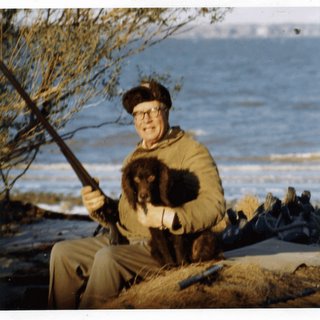 Because of the years he lived in the Dominican Republic, Dad spoke fluent Spanish. But he rarely had a chance to use it. He did, however, surprise me one time when a young man from Puerto Rico (whom I had met on a bus to New York) tried to follow up and see me again. My father told this poor young gentleman, in what sounded like blistering Spanish, to stay away from his daughter and never make contact again. That was humiliating.....
Because of the years he lived in the Dominican Republic, Dad spoke fluent Spanish. But he rarely had a chance to use it. He did, however, surprise me one time when a young man from Puerto Rico (whom I had met on a bus to New York) tried to follow up and see me again. My father told this poor young gentleman, in what sounded like blistering Spanish, to stay away from his daughter and never make contact again. That was humiliating.....Dad worked so hard for many years, and always seemed to struggle to make ends meet. He saw his family members occasionally, but we children never felt close to them (except for our grandmothers). Eventually, in the early 60's, my parents retired, sold the farm, and bought a home on the Eastern Shore of Maryland, outside Cambridge. To my Dad's delight, this place had quite a bit of waterfront on the Choptank River. He had a small wooden dory built for himself, and settled into an extremely happy life of puttering around on the water, harvesting oysters, fishing, and entertaining with my mother. Here he is out on the Choptank first with his grandson, Hunt Jr., and in the second photo with my twin brothers, Hunt and Dick.
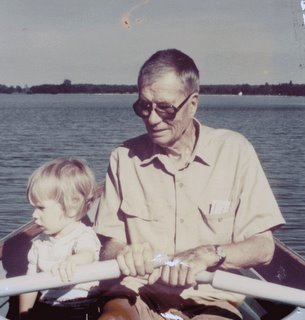
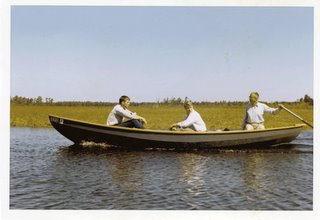
He was fond of his grandchildren, and never happier than when the whole family was together. We had a huge celebration for his 80th birthday. He died in 1985, after a long and debilitating illness. He and my mother were happily married for 43 years.
1 comment:
Hi, I just wanted to say I love reading your blog. Your reflections of family and your childhood memories are heartwarming. I thought the story of the pink dress you never bought was especially touching and relatable. I bet you looked wonderful in that dress. I wish you could have had it for the party. Looking forward to meeting you one day. bcwired (Daniella's college friend)
Post a Comment